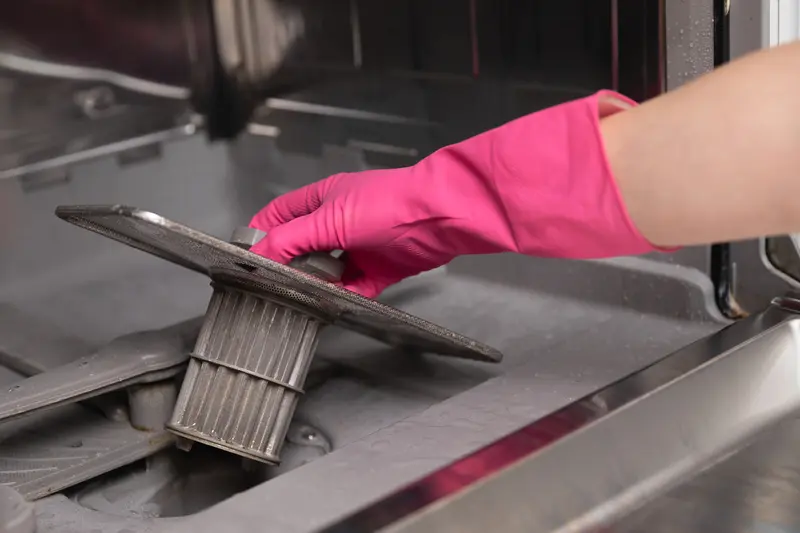Did you know that your dishwasher could be harboring over 300 different types of bacteria? A groundbreaking study from the University of Ljubljana and University of Copenhagen revealed something startling about these everyday appliances. That squeaky-clean machine you trust with your dishes might not be as pristine as you think, especially if you haven’t checked its filter lately.
Understanding what lurks in your dishwasher filter

Your dishwasher’s filter is designed to trap food particles and prevent them from recirculating onto your clean dishes. However, when left unchecked, these filters become perfect breeding grounds for numerous microorganisms. Research has identified 309 distinct bacterial species and 194 unique fungal varieties making themselves at home in dishwashers.
The most common inhabitants include Pseudomonas, Escherichia, and Acinetobacter bacteria, alongside Candida and Cryptococcus fungi. These microscopic squatters thrive in the warm, moist environment, particularly if you’re using hard water in your appliance.
Simple steps to maintain a clean filter
Maintaining your dishwasher filter doesn’t require professional expertise. Most newer models feature easily removable filters that can be accessed from the bottom of the tub. For optimal performance, experts recommend cleaning your filter at least once a month – more frequently if you notice debris on your dishes or detect unpleasant odors.
Start by removing the filter and gently washing it with warm, soapy water. A small cleaning brush can help dislodge stubborn particles. Avoid using abrasive cleaners that might damage the filter’s delicate mesh.
The hidden spots where bacteria multiply

Beyond the filter, your dishwasher harbors other potential trouble spots. The rubber seal around the door is particularly susceptible to fungal growth. Studies show that 70% of dishwashers contain yeast, while 10% harbor more problematic fungi. That mysterious orange or black residue you might spot? It’s likely Serratia marcescens, a bacterial biofilm that requires regular attention to control.
Weekly cleaning of the door seal with a solution of one part bleach to ten parts water helps prevent these unwanted guests from establishing colonies. Remember to wear rubber gloves during this process.
Preventive measures for a healthier appliance
Prevention proves more effective than cure when it comes to dishwasher maintenance. Consider installing a water softener if you live in an area with hard water, as mineral buildup can encourage fungal growth. Running monthly maintenance cycles with white vinegar effectively removes grease and eliminates odors.
Want to minimize bacterial growth between cycles? Keep your dishwasher door slightly ajar when not in use. This simple habit promotes air circulation and prevents the humid environment that bacteria adore. Also, resist the urge to open the dishwasher mid-cycle – the escaping steam can spread airborne bacteria throughout your kitchen.
When to replace your dishwasher filter

Even with regular maintenance, dishwasher filters eventually wear out. Signs it’s time for replacement include visible damage to the mesh, persistent odors despite cleaning, or recurring debris on your dishes. Most replacement filters are readily available and can be installed without professional help.
If your dishwasher is older than ten years, consider upgrading to a newer model with advanced filtration systems. Modern dishwashers often incorporate antimicrobial components and improved water circulation patterns that reduce bacterial buildup.
Remember, your dishwasher works hard to keep your dishes clean – returning the favor with regular maintenance ensures it continues functioning effectively while protecting your household. By implementing these simple practices, you’ll maintain a cleaner, more efficient appliance that truly delivers on its promise of spotless dishes.
